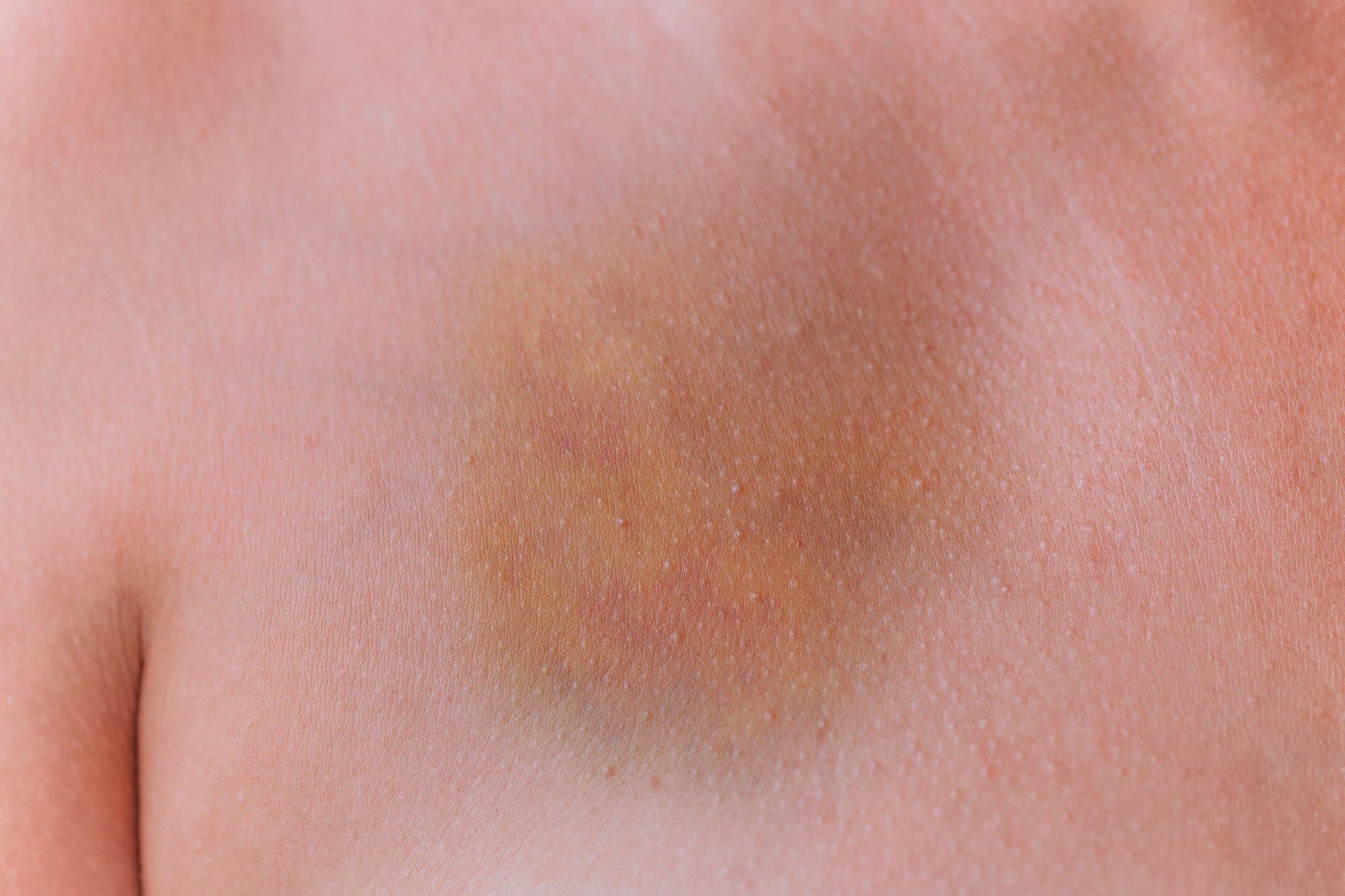What is a Chest Contusion?
A chest contusion, also known as a bruise to the chest wall, is an injury to the chest area caused by blunt force trauma.
It’s a common injury that can occur after a car accident or other physical trauma and can cause pain, swelling, and discoloration of the skin. In severe cases, it can also cause difficulty breathing and internal bleeding.
A contusion happens when small blood vessels are damaged due to trauma, such as an impact from a car accident. This trauma causes blood to leak out into the tissues under the skin causing discoloration or purple-blue bruises to appear on the chest area. It’s important to note that bruises are not just limited to the skin — they can occur inside your body as well.
In this blog post, we’ll be discussing the seriousness of chest contusions and what you can do to treat them if you experience one.
How can a Chest Contusion Happen During a Car Accident?
Chest contusions occur during car accidents due to blunt force trauma such as hitting the steering wheel, seat belt or dashboard of your car during an impact with another vehicle or object. This type of injury may not be immediately apparent, but will become more noticeable as time passes with swelling and discoloration of the skin as well as pain when pressure is applied to the area.
How Serious is a Chest Contusion and How Can I Treat It?
The severity of a chest contusion will depend on how severe the impact was during the collision and where you were sitting in relation to it. Those who were in the driver’s seat during an accident tend to experience more severe bruising than passengers because they would typically have been closer to the point of impact.
For example, if you experienced whiplash from being rear-ended by another vehicle, there’s a good chance you could have sustained some type of chest injury due to your torso being pushed forward sharply upon impact with the airbag system.
In addition, if you were wearing your seatbelt at the time of impact, this could also result in some form of bruising depending on how tightly it was secured around your body prior to the collision. This is often referred to as seat belt syndrome.
How Serious Is a Chest Contusion?
A chest contusion typically isn’t serious unless the person experiences extreme pain or difficulty breathing. In these cases, it’s important to seek medical attention immediately. If left untreated, a chest contusion can lead to internal bleeding and other complications.
It’s also important to be aware that chest contusions can hide more a serious injury such as broken ribs, chest infection, myocardial contusion, pulmonary contusion, organ damage like collapsed lung or other injuries.
Severe Chest Contusions
If you experience any of the following symptoms after an accident or physical trauma, it’s important to seek prompt medical treatment right away:
- Difficulty breathing
- Pain when taking deep breaths
- Fever
- Coughing up blood
- Loss of consciousness
- Broken Ribs
- Fractured Ribs
- Chest Wall Bruise
- Fractured Sternum
- Broken Bones
- Low Blood Pressure
- Pain in the Surrounding Tissue and Tissues Beneath
- Pain During a Deep Breath
- Decreased Mental Function
- Pulmonary Contusions
- Clammy Skin
- Heart Failure
How Do I know if My Chest Contusion Injury is Serious?
It is important to seek medical treatment for chest contusions right away so that any underlying injuries can be identified and treated before they become more serious. You should also keep an eye on any symptoms of a chest bruise such as coughing up blood, shortness of breath, difficulty breathing or speaking, dizziness, nausea or vomiting, or extreme fatigue that could indicate internal bleeding or organ damage. If these symptoms appear after leaving the scene of an accident, you should seek medical attention immediately. With proper diagnosis and treatment for chest contusions after a car accident, long-term health complications can be avoided.
Internal Injuries
Chest contusions could be indicative of internal injuries such as broken ribs or punctured lungs. If your chest hurts excessively after an accident, it’s important to get it checked out by your doctor for any potential internal damage caused by blunt force trauma.
Chest bruises can form on the outside of the body and still indicate that something has gone wrong internally. If left untreated, these injuries can cause further complications down the road, so it’s important to make sure you get the appropriate care.
Painful Coughing
If you have sustained significant bruising in the chest area due to an auto accident, coughing can become incredibly painful and even difficult to do at times. This is because when you cough your diaphragm contracts and expands which will cause pain in your chest if there is bruising present. In terms of treatment, taking over-the-counter medications like ibuprofen or acetaminophen may help relieve some minor discomfort while your body heals naturally over time.
Breathing Issues
In severe cases of chest contusions due to auto accidents, individuals may suffer from breathing difficulties due to those same bruises interfering with their respiratory system’s natural process.
Rib fractures due to chest trauma can cause a person to start shallow breathing and pain when they breathe deeply. This may lead to the need for support breathing medical attention.
Depending on how severe this issue is, medical attention may need to be sought out in order for proper healing and relief from symptoms associated with breathing issues caused by a chest contusion.
How Can I Treat My Minor Chest Contusion?
For minor pain following a car accident, If your chest contusion isn’t too serious and doesn’t require immediate medical attention, there are some steps you can take at home to help with the healing process after a blow to the chest:
Ice
Apply ice for 20 minutes at a time every few hours for the first 48 hours after the injury. This will help reduce swelling and pain. Make sure not to apply ice directly onto your skin; wrap it in a cloth first.
Ibuprofen and Acetaminophen
Take over-the-counter pain medications such as ibuprofen or acetaminophen per your doctor’s instructions if needed for pain relief. Ibuprofen pain medication can help reduce swelling and is commonly referred to as Advil. Acetaminophen is often helpful for pain and can also be referred to as the pain medication called Tylenol.
Rest
Rest as much as possible while allowing yourself to move gently throughout your day as needed until your symptoms improve.
Avoid Strenuous Activities
Avoid activities that involve heavy lifting or strenuous movement until your symptoms have subsided completely.
Dress Comfortably
Wear loose clothing until your symptoms improve so that you don’t put pressure on your chest area when moving around or breathing deeply.
Careful Stretching
Carefully stretching after a chest contusion following a car accident is an important part of the recovery process. Stretching should be done to help reduce pain and swelling associated with the injury while also increasing range of motion and restoring mobility. Depending on the severity of the contusion, individuals may need to start by performing gentle stretches such as arm and shoulder rolls or slow neck circles.
As individuals become more comfortable with their range of motion, they can gradually increase their stretches to include larger muscle groups such as the chest and upper back. It’s important to always warm up before stretching, since doing so will help prepare your muscles for exercise and prevent further injury.
Additionally, it’s essential that you don’t push yourself too hard or try to do too much too soon; instead, focus on your body’s feedback and take it slow. If any pain persists after stretching, it’s important to contact a medical professional for advice on next steps in healing. Ultimately, slowly progressing through safe and gentle stretches can help patients return to daily activities more quickly and effectively.
How Does a Doctor Diagnose and Treat a Severe Chest Contusion?
When diagnosing a severe chest contusion, doctors typically use imaging tests such as X-rays or CT scans to look for signs of tissue damage. They may also perform an ultrasound if they suspect internal bleeding or fluid buildup.
Additionally, the doctor may feel for tenderness or swelling on the affected area of the body. Once the diagnosis is confirmed, the doctor will determine the best course of treatment for the patient.
If you are in the emergency room, they often refer you to a chiropractor.
Treatment of a Severe Injury
The doctor may also recommend wearing a compression bandage or brace to reduce movement in the injured area and protect it from further injury. In some cases, surgery may be necessary to repair broken ribs or torn muscles in the chest area. Finally, physical therapy can help strengthen weakened muscles and improve range of motion in the affected region.
How Can I Prevent a Chest Contusion?
Motor Vehicle Crashes are often unavoidable; however, there are steps you can take to reduce your risk of experiencing a chest contusion or other serious injury while riding in a vehicle.
The first step is to make sure you’re wearing your seatbelt at all times while driving or riding in a car. Seatbelts help protect passengers by keeping them restrained in their seats during an accident; this reduces their risk of suffering direct impacts that could cause chest injuries.
Additionally, it’s important to ensure that all passengers wear appropriate headrests while riding in vehicles; headrests provide additional protection against whiplash and other neck injuries caused by sudden stops or turns during an accident.
Chest Contusions Injury the Chest Wall and Cause Broken Ribs
Chest contusions are common injuries caused by blunt force trauma like those experienced in car accidents or during sports activity but usually aren’t serious unless accompanied by extreme pain or difficulty breathing in which case immediate medical attention is necessary.
To treat mild chest contusions at home, doctors recommend applying ice for 20 minutes every few hours for the first 48 hours after injury, taking over-the-counter pain medications (if recommended by doctor), resting as much as possible while still allowing gentle movements throughout day, avoiding activities involving heavy lifting/strenuous movement until symptoms subside completely and wearing loose clothing until they do so too in order to avoid putting pressure on affected area when moving around/breathing deeply.
With proper care and attention, mild chest contusions should heal within days without further complication – always remember though that if you experience extreme pain/difficulty breathing then seeking medical treatment right away is essential!
Remember, you have 14 days to seek medical care after a car accident even if you don’t think you have an injury. Our medical team at Total Vitality Medical group specializes in car accident examinations. We understand the proper documentation to ensure you are covered by insurance for your care.

